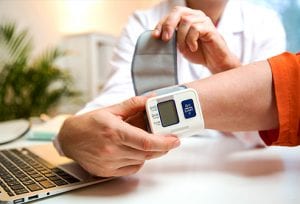Whether or Not You’ve Been Diagnosed, It’s Important to Take A Closer Look At The Effects of Type 2 Diabetes On Us Boomer-Aged Women
Diabetes in us older women can have negative effects as we age and experience menopause, making it crucial for us to know the warning signs and steps we need to take to live with it comfortably.

NABBW’s “Boomer in Chief,” Anne Holmes
The month of November flew by so fast I didn’t get everything done! Perhaps, you’ve also noticed that even in these COVID times, when we are staying home as much as possible, it’s very easy to get distracted from our best-laid plans due to having to focus so much on just simply coping with day-t0-day life as it unfolds.
As your “Boomer in Chief” of the NABBW, I had intended to write this post last month, to remind you that November is National Diabetes Awareness Month. I had meant to use that fact as a starting point to remind everyone of the effects that this disease can have on us women as we age. As a person with diabetes myself, I know first hand how challenging it can be to manage our symptoms.
While it’s no longer Diabetes Awareness month, I hope — whether you have already been diagnosed with Type 2 Diabetes or not — you will keep reading.
We all need to know how diabetes can affect us Baby Boomer-aged women, and that even if we don’t currently have Type 2 Diabetes, we can acquire it as we age. We also need to know what precautions we can take to prevent its onset or to make such a diagnosis easier to take.
Exactly What Is Diabetes?
Diabetes is a medical condition that causes the blood glucose, or sugar levels in one’s body to be higher than what is considered safe. This can happen in one of two ways, as there are two main kinds of diabetes.
In Type 1, the body does not produce enough insulin to break down sugar after a meal, whereas in Type 2 (T2D), the body does not respond properly to the insulin being made. In both cases, the pancreas is unable to break down the energy nutrients we need to function, which can lead to further health complications.
The Warning Signs
 Now that we know what diabetes is, it’s important to go over some of the warning signs we need to watch out for. And it’s important to periodically review these signs, because sometimes, when we are diagnosed in early or mid-life, we may not show any of the warning symptoms. But as we age, it’s possible that we may begin to experience them. And more disturbingly, we may start to experience further complications.
Now that we know what diabetes is, it’s important to go over some of the warning signs we need to watch out for. And it’s important to periodically review these signs, because sometimes, when we are diagnosed in early or mid-life, we may not show any of the warning symptoms. But as we age, it’s possible that we may begin to experience them. And more disturbingly, we may start to experience further complications.
A friend of mine, who’s had her diabetes under control for decades, recently confided in me that she’s really lost control of her blood sugar levels, and in order to try to regain them, she now tests herself hourly. She’s a doctor, so she clearly knows the importance of keeping her glucose levels in check.
If You’re Not Familiar With the Diabetes Warning Signs, They Include:
- Fatigue
- Constant urination
- Extreme hunger or thirst
- Tingling in the hands or feet
- Sudden weight loss
- Headaches
It’s important for me to remind you that you may not always experience these symptoms initially – I know I didn’t – or they may not lead you to think of diabetes. This is why it’s crucial to ask your doctor to do a routine blood glucose screening when you visit, to ensure you catch any onset in time to treat effectively.
Diabetes And Menopause
 As women, we all know that we typically begin to experience menopause after the age of 45. We probably also know that menopause is defined as the time when our menstrual cycle ceases for at least 12-months, because our bodies have stopped producing estrogen and progesterone.
As women, we all know that we typically begin to experience menopause after the age of 45. We probably also know that menopause is defined as the time when our menstrual cycle ceases for at least 12-months, because our bodies have stopped producing estrogen and progesterone.
But you may not be aware that when we women who have diabetes start to undergo menopause, it’s is not uncommon for us to face complications beyond those faced by menopausal women who do not also have T2D.
The menopausal changes in our hormones, can actually cause our blood sugar levels to fluctuate. At first thought, this may surprise you, but when you consider it, you’ll probably realize it all makes sense. So much of what happens within our bodies is inter-related.
Especially When You Consider the Prevalence of Metabolic Syndrome Among People Our Age.
 If you’re not familiar with Metabolic syndrome, it is a clustering of at least three of the following five medical conditions:
If you’re not familiar with Metabolic syndrome, it is a clustering of at least three of the following five medical conditions:
- Abdominal obesity
- Hypertension (high blood pressure)
- Hyperglycemia (high blood sugar)
- High serum triglycerides and
- Low serum high-density lipoprotein (HDL)
I know my doctor insists on seeing me quarterly, because she is paying close attention to my bloodwork and blood pressure. Your doctor probably focuses on this as well.
That’s because Metabolic syndrome is associated with higher risks of developing cardiovascular disease and T2D. And, insulin resistance, metabolic syndrome and prediabetes are closely related and have overlapping aspects.
And of course, if we can’t get our blood sugar levels under control, we run a far greater risk of experiencing diabetes discrepancies and weight gain, as our bodies adjust to these changes.
And Then There’s the Issues of Sleep and Sex… Or the Lack of Either
 Adding insult injury, so to speak, we often also begin to experience sleep challenges as we age. And this issue may be worse if we’re a menopausal person with T2D.
Adding insult injury, so to speak, we often also begin to experience sleep challenges as we age. And this issue may be worse if we’re a menopausal person with T2D.
During this phase of of our lives, it’s common to experience hot flashes or excessive sweating at night, which may keep you from comfortably sleeping. When this happens, sleep deprivation can make it more difficult to stabilize your blood sugar levels.
Another common negative side effect is sexual dysfunction. This happens because diabetes causes damage to the cells that line the vagina, and when that’s combined with our normal tendencies toward menopausal vaginal dryness, the potential for pain or discomfort during sex can be debilitating.
Diabetes With Menopause Can Also Impact Our Mental Health
 The brain naturally experiences some functioning changes as aging occurs, and diabetes has been found to increase the development of dementia. Since the disease can impact brain function if not treated right away, it can result in decreased memory and brain function.
The brain naturally experiences some functioning changes as aging occurs, and diabetes has been found to increase the development of dementia. Since the disease can impact brain function if not treated right away, it can result in decreased memory and brain function.
Women, in general, are twice as likely as men to develop depression, and those with diabetes are even more prone to developing a mental health condition. Depression in women with diabetes is more likely for multiple reasons, such as premenopause, menopause, postpartum, aging, and high-stress levels.
It’s also possible that as diabetics, we may experience higher concentrations of serotonin because we are insulin resistant, and the higher serotonin levels can increase our risk of depression — and potentially even suicide. Even just the mere diagnosis of the T2D may cause us to become depressed. I know that in my case, it did. I was diagnosed a week before my husband and I were to leave for a cruise.
Talking to the dietician counselor immediately upon my diagnosis, I found that while it was helpful for her to advise me of the lifestyle changes I needed to make, it was also terribly stressful and depressing. As we headed off for our cruise, instead of being excited for a much needed vacation, I felt totally out of control. Fearful and unsure of whether and how I would possibly be able to begin managing the lifestyle changes I needed to make, while I was away from the comfort of my day-to-day environment.
Thankfully I confessed my feelings of overwhelm to another person on the cruise – a man who was incidentally assigned to the same dining table as we were. I say thankfully, because, it was actually a blessing from Above. While he was a stranger to me, it turned out he was also a person successfully living with diabetes, and he cheerfully advised me that I COULD manage to live quite well with T2D. And gave me tips on how to successfully manage the cruise.
Changes In Lifestyle
 I now know that my experience of diabetes-diagnosis overwhelm was not unique. When anyone receives this news, it is all too easy to feel devastated and stressed about the lifestyle changes we need to make to properly manage our symptoms.
I now know that my experience of diabetes-diagnosis overwhelm was not unique. When anyone receives this news, it is all too easy to feel devastated and stressed about the lifestyle changes we need to make to properly manage our symptoms.
This is especially challenging for those of us who are diagnosed in our later years. We all have deeply ingrained habits, and changing them, modifying our lives to adjust to our new daily routine is always going to be challenging.
As with me on the cruise, it’s not unusual, as a newly diagnosed person with T2D, for us to start experiencing social changes, like being afraid to go out to eat with friends, being “freaked out” over any potential weight gain, and experiencing “FOMO” (fear of missing out) because we are tired or mentally drained.
These diabetic lifestyle changes can cause us to feel anxious — and even lose our appetite. This is not good, since limiting the number of nutrients we consume and interfering with our carefully planned eating schedule, can mean our glucose levels destabilize – which, of course, is not a bad situation.
How To Limit The Negative Effects
While you can’t completely prevent or cure T2D, there are healthy lifestyle habits that we can take to limit our chances of being diagnosed or our disease worsening. Whether you already have diabetes, or you want to limit your chances of developing it, here are some measures you can do to feel that you are still your best self, no matter what your age:
- Maintain a healthy diet rich in fruits and vegetables to ensure you’re getting the nutrients you need and avoid eating overly sugary or processed foods.
- Exercise daily for at least 30 minutes to get your heart rate pumping for increased blood flow and stronger bone health.
- Keep your mind active by engaging in activities that make your brain work, like reading, journaling, or doing puzzle games. This is especially important now, while we are also living during the Time of COVID.
- Visit your doctor regularly, to ensure your health is in check and to stay on top of any changes. Also, to ensure that any medications you’re on are working properly and to ask about other options, if needed.
- Use your blood glucose meter and test strips to check your blood sugar levels to keep track of any changes in blood glucose and speak with your doctor if there are any noticeable changes.
- Seek help when you need it – not only to help keep you in your best health but also because it helps you remember that you’re not alone in this world, and you deserve to get support when you need it.
Finally, remember diabetes onset isn’t always immediately noticeable, so it’s important to stay on top of your health and check in with your doctor regularly. The diabetic impacts do increase as we age, so you need to be sure to take care of yourself. That’s the best way to assure that you continue to live your best life and do all of the things and people you love, without letting diabetes get in the way.


